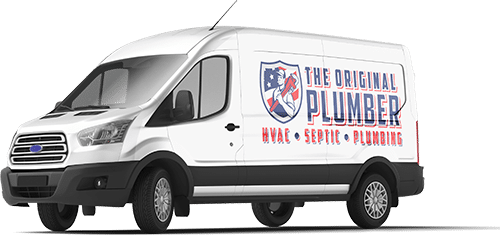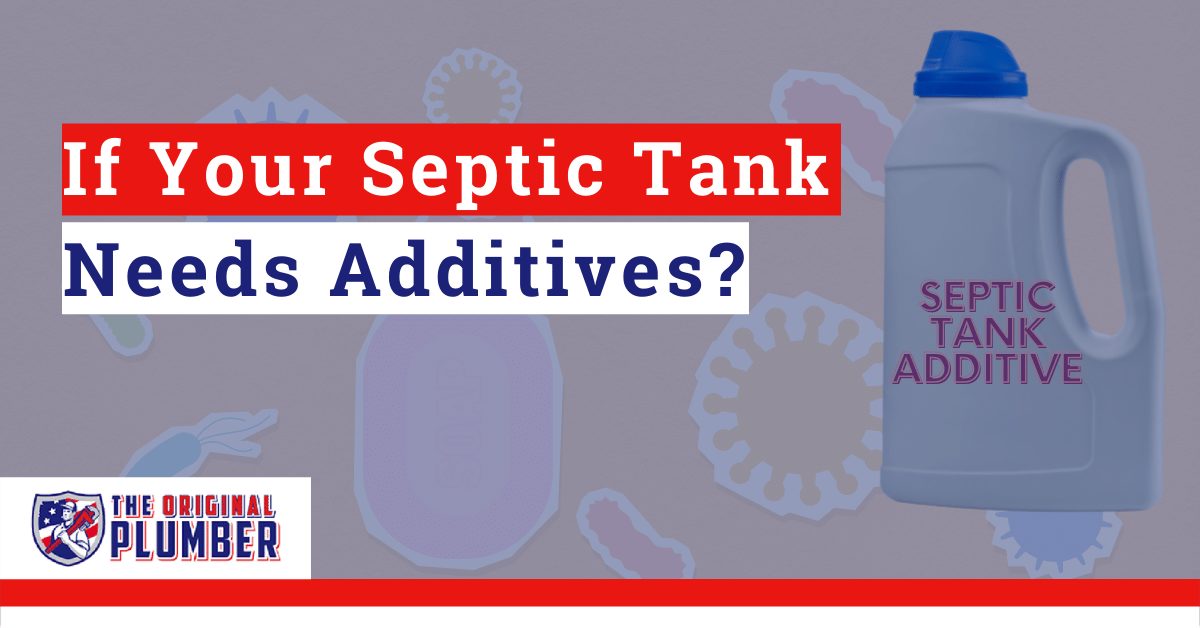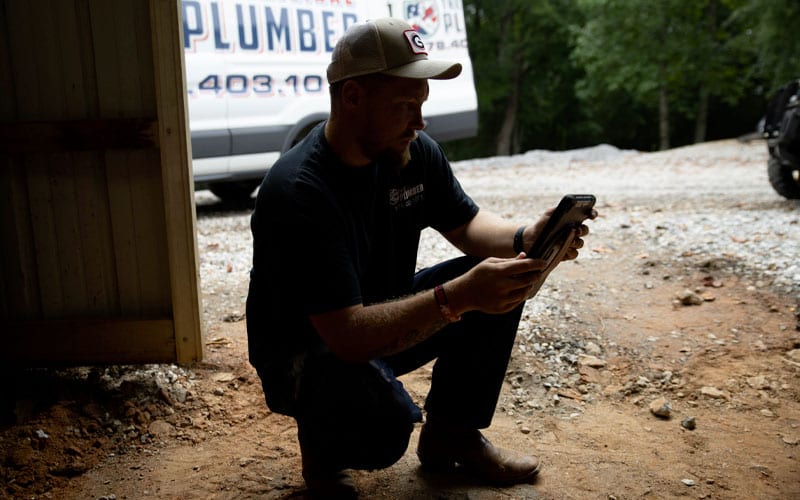Septic tank owners have probably heard about septic tank additives and you might be wondering if you need to use them to maintain a healthy septic system. With so many choices, how do you know which septic tank additives to pick for your septic system? Do you really need septic tank additives? We’re going to let you know when and why you should use a septic tank additive and when to skip them and call in the professionals.
How Does My Septic System Work?
One of the first things you need to do as the owner of a septic system is to learn how the entire system works. There’s a delicate balance that needs to be maintained within your septic system.
Your septic system is made up of a few basic components:
- Septic tank: this is where the natural waste and wastewater from your house end up when you flush your toilet or put something down the drain.
- Overflow tank: if your main septic tank fills up for some reason, this tank will contain any of the solid waste and wastewater.
- Pipes: the pipes of your system need to remain clear in order to work properly. You’ll have pipes running from your house to the septic tank and from the septic tank to your drain field for the water to leave your septic tank and keep it from overflowing.
- Drain field: the drain field is sometimes also called a leach field and this is where the water leaves your septic tank and seeps back into your yard.
Inside your septic tank, you’ll a few things:
- Aerobic Bacteria: aerobic bacteria require oxygen to live and break down water in the drain field of your septic system
- Anaerobic Bacteria: anaerobic bacteria doesn’t require oxygen to survive so their job is to break down the solid waste in your septic tank
- Enzymes: enzymes work to break down solids to make them easier for the bacteria to digest
- Sludge Layer: the sludge layer is the very bottom layer of your septic tank and turns into solids if your septic tank is not properly cared for
- Liquid Layer: inside your septic tank, the middle layer is the liquid or effluent layer
- Scum Layer: the top layer of your septic tank has the scum layer where you’ll find things like oil, fats, and grease
Just from regular daily usage, your septic system gets the necessary amount of natural bacteria and enzymes it needs to maintain a healthy environment. You rarely need to do anything extra to help the aerobic or anaerobic bacteria to break down the sludge and natural waste in your septic tank.
How Do I Know If My Septic Tank Needs Additives?
Most septic systems already have the right balance of natural bacteria and enzymes and don’t require any kind of additional additives or septic tank treatments for them to work properly. If you’re frequently using the septic system in your home, you’re likely adding enough to your system.
In the event that you’re putting a new septic system in at your home, you may be seeing recommendations to add “starter cultures” to your new system. This usually isn’t necessary as you’ll be adding enough bacteria to your new septic system with normal usage.
For vacation homes or homes that don’t have much septic system usage, it’s important to have a regular septic system maintenance appointment with your local septic professional to determine the best course of action for these septic systems to be sure your septic tank works properly.
Before you add any kind of additives or a septic tank treatment to your septic tank, be sure to check any local regulations as well. If you’re in an area where there are specific regulations about what can be added to the groundwater, septic tank additives might not be an option for you.
Most septic system owners will start looking for additives for the system when they have a clog or unpleasant odors coming from the septic system and drain field.
Before you look at additives to solve either of these problems, it’s best to call a technician to make sure you don’t have a bigger problem. The additive may solve the problem for now, but if there’s a bigger problem that remains untreated, you’ll be facing the same issues over and over again until you have your septic system serviced by a professional.
Chemical Additives
If you’ve been advised to use chemical additives in your septic tank, you’re probably wondering which ones are the best choices for your system.
These types of additives are meant to handle things like clogs in your systems, control odors, and help to break down grease so they’re meant more as a one-time treatment for a problem than a long-term treatment plan.
Some of the most common chemicals in septic tank additives include:
- Hydrogen peroxide
- Formaldehyde
- Baking soda
- Alum
These chemical additives could be harmful to the soil and make it harder for the wastewater to soak back into the soil in the drain field.
Biological Additives
Looking for more natural additives to use for your septic system? There are additive options that aren’t chemical-based. Things like bacteria, yeast, and enzyme-based products are all considered biological additives.
Using biological additives can lead to a buildup of methane gas and can also clog drainage pipes, leading to more problems and needing a service call from your septic system technician.
Ways to Add the Septic Tank Additives to Your Septic Tank
If you decide you need to add some kind of additive to your septic system, there are a few different ways you can do that:
- Pods
- Tabs
- Powder
- Liquids
- Organic material
Be sure to follow the manufacturer’s directions on how and when to add these additives to your septic system so you don’t do harm. Every product uses a different amount based on the size of your septic tank and has a different schedule for how frequently you should use the products.
How Can I Avoid Using Additives?
You can maintain your septic system without adding things to your system. Here are some tips for avoiding issues with your septic system:
- Avoid antibacterial products. While antibacterial soaps can be great for getting those germs off your hands, they also get rid of the bacteria in your septic tank.
- Use the right toilet paper. If it isn’t made for septic use, you could be at risk for clogged pipes and solids building up in the bottom of your septic tank that won’t break down.
- Limit the use of harmful chemicals. Things like bleach, drain cleaners, cleaning solutions, and other harsh chemicals can be very harmful to the bacteria and enzymes living in your septic tank. Look for cleaning products that are more natural or specifically designed for use in homes with septic systems.
- Only flush organic waste and toilet paper. Flushing things like unused medication, cosmetics, and feminine hygiene products can be harmful to the bacteria and enzymes living in your septic tank and cause clogs.
Be very mindful of what’s going down the drains in your home. People flush things like diapers, cigarette butts, coffee grounds, and even lint from your laundry can wind up going down the drain and causing clogs and damage inside your septic tank. These things don’t break down naturally like organic or human waste.
If you have done these things and think your septic system might be out of balance, it’s important to contact a professional septic technician like The Original Plumber & Septic so they can come out and do an inspection for you.
The technician can offer you suggestions based on your current system and needs. Suggesting things like installing an effluent filter can help lengthen the life of your septic system by reducing the amount of solid waste leaving the septic tank can help to reduce the chance for clogs to happen, saving you the cost of a service call to break up the clogs.
You Still Need Regular Septic Tank Maintenance
Even if you decide to use septic system additives, you still need to have regular maintenance done on your septic system. Keep scheduling appointments to have your septic system inspected, as well as to have your septic tank pumped.
The cleaning solutions and treatment process that will work best for your specific septic system can be determined during your initial inspection with a septic technician. You can come up with a plan based on the current state of your system and usage.
Your regular septic system maintenance will also help to save you money over time. By knowing your system is working well and through regular inspections, you’ll be able to better plan for repairs and replacement costs.
Call The Original Plumber & Septic today for a free consultation. We’re available 7 days a week to help with all of your septic and plumbing needs for your home or business. One of our friendly and professional team members will be able to answer your questions about septic tank additives.
When we come out for your septic inspection, we encourage our customers to ask questions about their system to learn how to best care for their septic system on a daily basis. Learning about your septic system’s specific needs helps you know what’s normal and when you need to call us to come out and clean or pump your septic tank.






